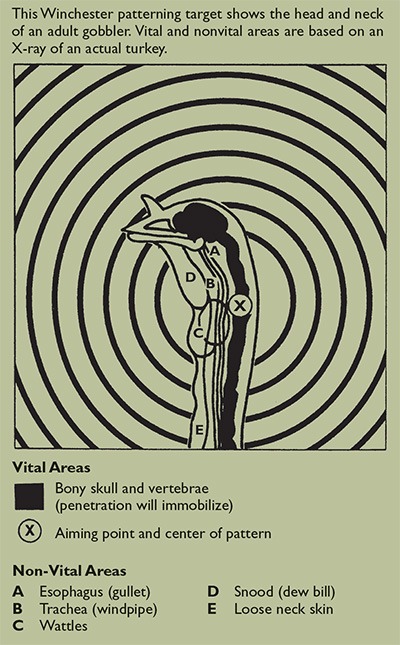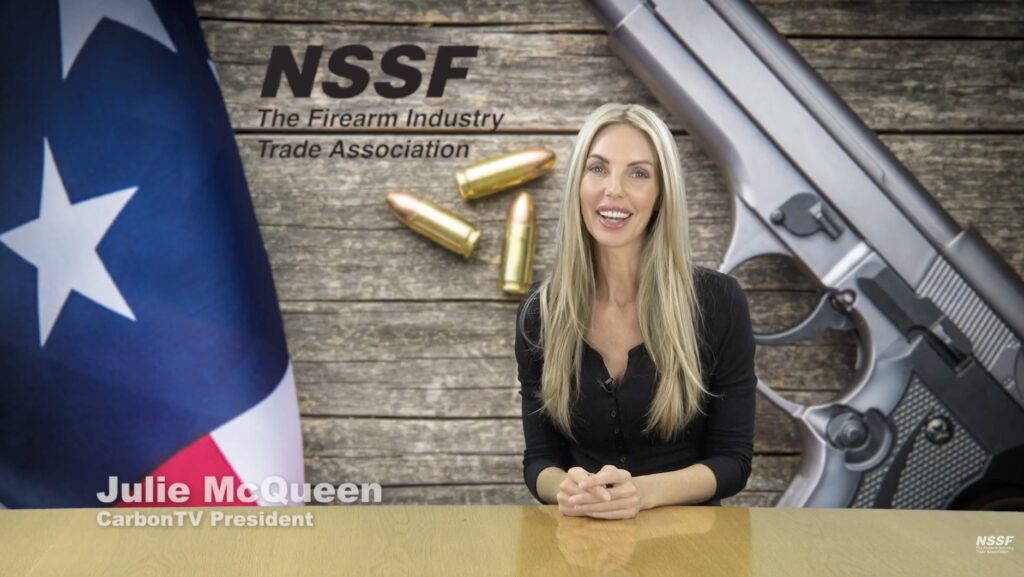
Ensuring a Safe Hunt: Julie McQueen’s 7 Essential Hunting Safety Rules
With the fall hunting season upon us, it’s an ideal time to reinforce the importance of responsible, ethical, and secure hunting practices.
NSSF® and CarbonTV have announced a cooperative HuntSAFE partnership to promote hunting and firearm safety during the fall hunting season, starting with a new video, “Safety is Always in Season.” We are grateful to be joined by CarbonTV in spreading this critical message.
In the realm of firearm ownership and hunting safety, HuntSAFE stands as a beacon of guidance and responsibility. It’s a vital component of the NSSF’s Project ChildSafe® initiative, dedicated to promoting safe firearm handling, secure storage, and preventing unauthorized access. The acronym S.A.F.E. succinctly sums up the principles: Store your firearms responsibly when not in use; Always practice firearm safety; Focus on your responsibilities as a firearm owner; and Education is key to preventing accidents.
This video, “Safety is Always in Season,” features Julie McQueen, President of CarbonTV and host of “Outdoor Weekly.” She shares seven “rules to live by” when using or handling firearms at home, on the range, and especially in the field.
7 Hunting Safety Rules
By Julie McQueen, President of Carbon TV and host of “Outdoor Weekly.”
For everyone who enjoys our hunting heritage, wants to share it with friends and family and wants to see participation in hunting grow, I’ll be blunt: we’ve got to model every aspect of hunting safety. The fact is, whether in the field, at the range or in your house, firearm accidents are preventable. I want you, your friends and your kids to always be safe and responsible Hunters so Carbon TV has partnered with the National Shooting Sports Foundation’s project ChildSafe program to provide these hunting safety tips.
I know you and your hunting partners will keep them top of mind before, during and after the hunt. The rules of hunting safety are pretty simple, but because of that, some people can get too casual and that’s when accidents can happen my advice is don’t just think of these as tips but as actual rules to live by.
-
Keep the Muzzle Pointed in a Safe Direction
Keeping the muzzle pointed in a safe direction is the foundation for preventing gun accidents. This means always being aware of where the muzzle is pointed and never grabbing, moving or passing a gun by the barrel.
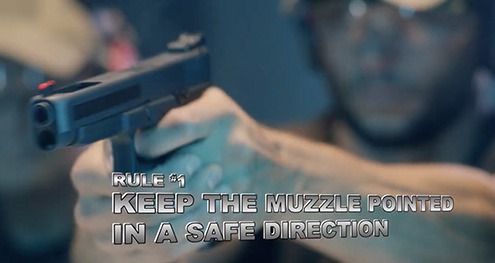
-
Always Assume a Gun is Loaded
Always assume a gun is loaded even if it looks like the magazine is out there may still be around in the chamber, so don’t take any chances. Always check before handling a gun and keep your fingers off of the trigger.
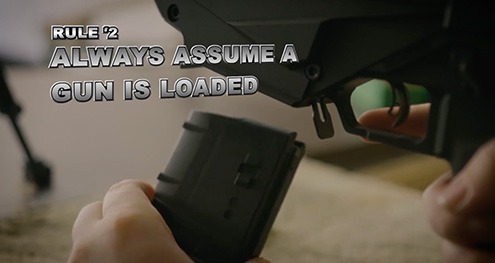
-
“Safety On” is Not Enough
Having the Safety on is not enough. Of course, you should always keep the safety on until you’re ready to shoot, but don’t rely on it as the only way to prevent a gun from going off. The safety is a mechanical device and it can fail, so remember rule number one and two and watch the muzzle and keep your finger off the trigger until it’s time to take the shot.
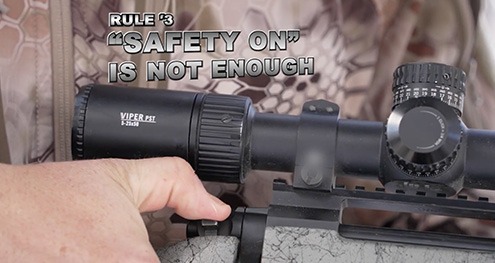
-
Be Certain of Your Target
Be certain of your target two things here: Firstly you want to be absolutely certain that what’s in your sights is legal game, it is no fun telling a game warden that you accidentally shot a doe if you’re only allowed to shoot a buck you also don’t want to accidentally shoot another hunter; Secondly, you want to be certain of your target and what’s behind it, centerfire bullets can travel well over a mile so make sure the area behind the target is clear of other animals other hunters, structures and vehicles.
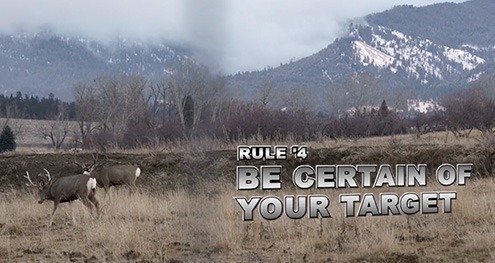
-
Identify Yourself
You don’t want to be mistaken for game by other hunters, so wear blaze orange in the field, avoid colors or patterns that can be confused for game, use a flashlight if you need to and make sure you’re easily identifiable. This is especially important if you’re packing out a deer or other animal where the antlers on your pack could become a target.
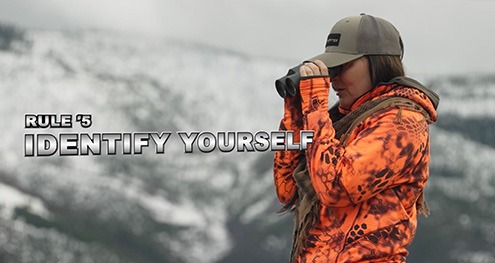
-
Unload Your Firearm at Obstacles
A trigger can get caught on just about anything, so clear the chamber or unload the gun completely before you have to climb across a stream or over a log over a fence legally, of course, or when you’re passing a gun back and forth to a companion and again never pull a gun towards yourself by the muzzle.
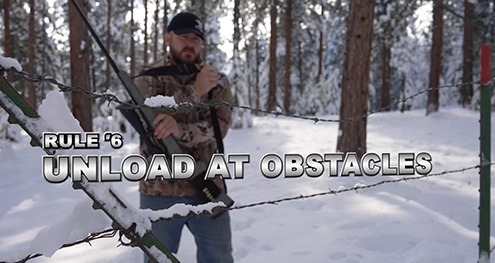
-
Tell Someone Where You Will be
Make sure someone knows where you’re going to be and when you’re supposed to be back, especially if you’ll be hunting alone. Emergencies do happen and time is of the essence if you need to be rescued, make sure searchers know where to start and it can absolutely save your life.
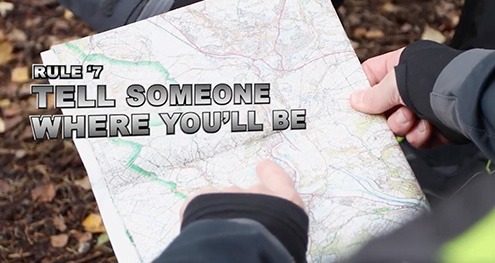
One last thing to remember when the hunt is over: store all your guns securely, storing your guns in a locked container is the number one way to prevent them from being picked up by a child in your home or stolen from your house or car. Using a cable lock also adds another level of security to a gun safe or a lock box. Learn more about storing firearms securely in your home here.
A successful hunt isn’t just about harvesting game a successful hunt means that you and everyone in your party gets home safely. You can’t pass on the hunting heritage if you’re not here it’s just that simple. Make these safe hunting rules a priority and pass them on no matter where or when you hunt. Safety is always in season.
Learn more at CarbonTV.com/firearm-safety
This message was developed in partnership with CarbonTV and the National Shooting Sports Foundation® in support of NSSF’s Project ChildSafe® firearm safety program and HuntSAFE initiative.
You may also be interested in:
 Turkeys make a tough target. They are difficult to see and even harder to harvest. The head and neck are the only vital areas that ensure a fast, clean hunt, but this will only happen if your shotgun throws a tight, dense shot pattern.
The best shotgun choice for turkeys is a 12-gauge magnum, though the 10 gauge is gaining some ground among turkey hunters. The best shot sizes are No. 2, 4, 5, or 6. The best shotgun chokes are Full, Extra Full, and Super Full.
Turkeys make a tough target. They are difficult to see and even harder to harvest. The head and neck are the only vital areas that ensure a fast, clean hunt, but this will only happen if your shotgun throws a tight, dense shot pattern.
The best shotgun choice for turkeys is a 12-gauge magnum, though the 10 gauge is gaining some ground among turkey hunters. The best shot sizes are No. 2, 4, 5, or 6. The best shotgun chokes are Full, Extra Full, and Super Full.
